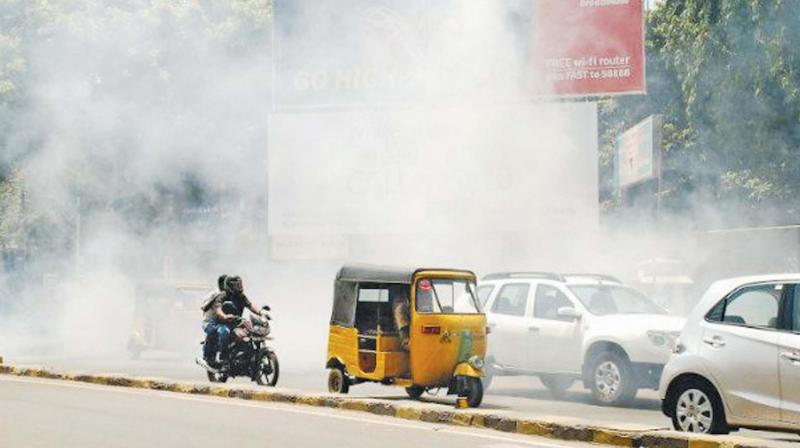Chennai: Most vehicles run sans PUC certificate
The problem, however, is that not too many sign up for an emission test every six months.

Chennai: A recent study by the Centre for Science and Environment (CSE) ranked Chennai second, only behind Delhi, on emissions of heat-trapping carbondioxide, toxic pollutants, particulate matter and nitrogen dioxide in the air due to urban commute.
Experts say the primary cause is that most vehicles in the city run without a Pollution Under Control (PUC) certificate that indicates no compliance with pollution control norms. Though the Central Motor Vehicles Rules, 1989, states that every vehicle should get the PUC certificate every six months from an approved PUC centre, it is not followed by a majority of the private vehicle owners, says Bhargab Mitra, Professor, Department of Civil Engineering, IIT and an environmental activist.
PUC testing is the only existing mechanism to monitor the emissions of vehicles and ensures that they adhere to the Bharat Stage IV Emissions standards, which was adopted by the country in 2000. There are 45 authorised emission testing centres within the jurisdiction of the Regional Transport Offices (RTO) within city limits and a further 17 centres attached to Thiruvallur and Meenambakkam.
The problem, however, is that not too many sign up for an emission test every six months. “They might get their vehicle serviced, but almost never do they get a PUC certificate,” says Bhargab.
Around 10 vehicles come to us on average for testing daily, says Abu Backer, who runs a testing centre in Ashok Nagar. “Most of them are cabs and autos which require certificates to ply with aggregators like Ola and Uber. Most people who own private vehicles are unaware that the certificate needs to be renewed. Those who do, only do so when they have to deal with RTO for processes like a change of ownership of a vehicle,” he says.
A basic test should only cost about Rs 40, but because private vehicle owners are willing to pay a bribe to get a ‘pass’ certificate, about Rs 500 is usually shelled out. There is also an absence of a system to check the status of the PUC certification for all vehicles in the city. The number of PUC centres is also woefully inadequate to cater to the number of vehicles.
“Initially, it took 60 years (1951-2008) for India to cross the 100 million registered vehicles mark. However, the next 100 million were added in a mere six years (2009-15),” said Anumita Roychowdhury, Executive Director, Research and Advocacy, CSE.
This has resulted in a situation where the transport department data says that 96% of the vehicles in the state of Tamil Nadu may not have valid PUC certificates. Even traffic police, who stop vehicles for checks ignore the PUC certification, says Bhargab. They don’t attach as much importance to emissions certificate as to the RC book, driving licence and insurance copy. “Most traffic police only check it in hill stations and other protected areas. In cities, where it is required, they don’t check. If they do, it is only to ask for a bribe,” he added.
In July 2018, a Supreme Court directive said that a PUC certificate will be made a mandatory document to make an insurance claim. The claims will not be paid for if PUC certificate is found to be invalid on the day of the accident, the court said.
However, insurance companies argue that enforcing PUC certificates should be done by the Road Transportation Authority (RTA) and should not be imposed through them.

